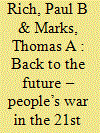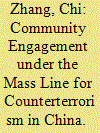|
|
|
Sort Order |
|
|
|
Items / Page
|
|
|
|
|
|
|
| Srl | Item |
| 1 |
ID:
152958


|
|
|
|
|
| Summary/Abstract |
This issue of Small Wars and Insurgencies focuses on the continuing importance of Maoist and post-Maoist concepts of people’s war. It has assembled a collection of papers that addresses various examples from around the world, with an emphasis on South America, where the premier illustration, that of Colombia’s FARC, was Marxist-Leninist but not Maoist, yet embraced the form and strategy of people’s war in a bid which at one point had the state in a critical situation. The collection comes in the wake of previous papers published in this journal on politically Maoist insurgent movements in South Asia, notably Mika Kerttuenen’s study of Maoist insurgents in Nepal and Prem Mahadevan’s survey of Maoist insurgencies in India and their links to organized crime (Kerttunen, “A Transformed Insurgency,” 78–118; Mahadevan, “The Maoist Insurgency in India,” 203–20). The papers confirm that people’s war remains an important analytical framework in the study of small wars and insurgencies, for some even a ‘model’ through which to understand distinct types of insurgent movements and their strategies.
|
|
|
|
|
|
|
|
|
|
|
|
|
|
|
|
| 2 |
ID:
181734


|
|
|
|
|
| Summary/Abstract |
The mass line principle offers an alternative approach to mobilize citizens to participate in governance. The key tenets of the mass line principle resemble that of the regime of community engagement, aiming at encouraging democratic participation, improving the trust between the rule and the ruled, and improving the ability of the government to gather intelligence. In the context of China’s counterterrorism strategy, the mass line involves the encouraging citizens’ participation in the People’s War on Terror, incentivizing individuals to provide tip-offs, and engaging patriotic believers, opinion leaders, grass-roots propagandists, and cultural workers to persuade and educate the masses to adopt “correct” views. In addition, the government seeks to publicize the voice of Uyghurs from within the community. However, such efforts only served as evidence for intolerance for diversity and an invitation for further suspicion and criticism. This article demonstrates the trust dilemma the state faces—in order to improve democratic participation, the efforts to engage a community and gather intelligence often result in eroding the trust. This article also highlights the importance of differentiating harmony and political conformity. Diversity per se is not the source of conflict, but it is often targeted by the state as it is desperately seeking to demonstrate efficacy in the face of terrorism.
|
|
|
|
|
|
|
|
|
|
|
|
|
|
|
|
|
|
|
|
|